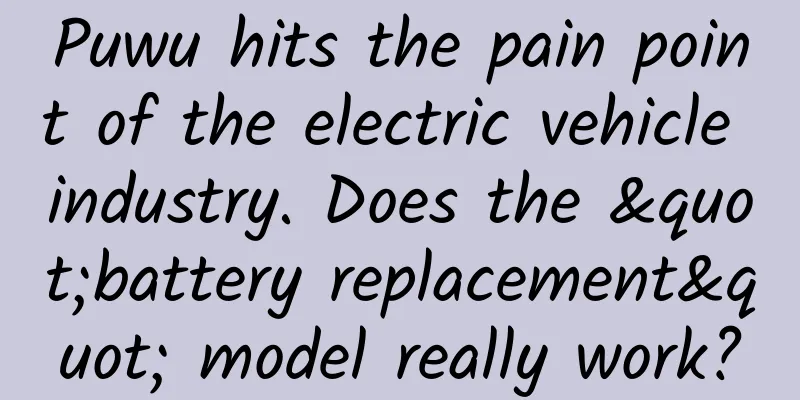Puwu hits the pain point of the electric vehicle industry. Does the "battery replacement" model really work?

|
After all, not everyone has the ability to manufacture a Tesla, or the courage to manufacture the "shell" of an electric car like Youxia. If you really want to enter the electric vehicle field, then electric bicycles, whose domestic user base is calculated in the "billion" units, have become a new direction for many entrepreneurs. The core of electric vehicles is "electricity", which is an advantage in energy utilization, but like the electronic products we are familiar with, "running out of power" during use has also become a constraint and bottleneck for electric vehicles. On September 10, a company called "Puwu" held a product launch conference titled "Infinite Energy, Infinite Possibilities". Focusing on the current problem of electric vehicle endurance, it proposed a new idea of "battery replacement" for electric vehicles using the Internet, starting from the business model. Compared with charging, "battery swapping" means replacing the long-term cycle charging of electric vehicles with a quick battery replacement method. Can this seemingly simple method really solve the pain points of the electric vehicle industry? After the press conference, we got more information from Zhao Qingjiang, co-founder of Puwu.com. There is a way to expand offline battery swap construction Although it takes a long time to charge the battery of a traditional electric vehicle, you only need to find a socket. In contrast, "battery replacement" for electric vehicles requires the establishment of complete offline facilities in the actual environment where electric vehicles are used. It must be convenient anytime and anywhere, which is a huge project. In this regard, Zhao Qingjiang said that in order to achieve the idea of "battery replacement", on the one hand, Puwu will build its own power station, and on the other hand, it must unite many existing offline stores and use existing store resources and channel resources to greatly reduce the expansion cost of the mall. At present, Puwu's focus is mainly concentrated in the capital cities and sub-provincial cities of 26 provinces and cities across the country, and it already has more than 10,000 offline shopping malls. By the end of 2015, it will have completed the construction of 20,000 battery swap stations and built a battery swap network covering most of the key cities. By 2016, the Puwu network will cover all county-level units, and the number of outlets will exceed 100,000. The “three-kilometer” concept is not just empty talk At the press conference, Puwu proposed that its ultimate goal is to have an offline store every three kilometers. In other words, around every user, there will be a Puwu outlet providing various services within a few kilometers. In a country as vast as China, this seems to be an impossible task, but Zhao Qingjiang doesn't think so. He emphasized that most people may think that three kilometers is very dense, but taking a 30 km × 30 km city as an example, only about 100 points are needed, which is relatively small compared to the imagined very dense number. It is relatively easy to find 100 points in a city. Now, any city in the electric bicycle industry will have more than 200 points. Some larger cities, cities with a little scale, have 400 to 500 points, or even 1,000 points. Puwu is a platform rather than a simple electric car brand. Franchisees will become an important part of this platform. Franchisees can directly get cost-effective products on the platform. Puwu does not earn any intermediary profits, breaks the marketing system, attracts more franchisees to join, and drives the whole thing forward. The popularization of the Internet allows online and offline connections As for how to find a place to "swap batteries", Puwu's solution is to use the most direct and effective mobile phone APP, which is also the most direct embodiment of Puwu's Internet thinking. Just like map software, it helps users navigate to service points and even provides more online services. For example, when the battery is running out, the APP will automatically remind users to go to a nearby power station to swap batteries. However, there are some differences in age between smartphone users and electric bicycle users. Will it be a new problem to ensure that elderly people who often ride electric bicycles can also master the operations on smartphones proficiently? Zhao Qingjiang seemed quite confident about this. He revealed that he had conducted a survey and found that the Internet is now more widely used than we thought. "Although many people may not do much with the Internet, at least they can use smartphones and WeChat, and even middle-aged women can create WeChat groups. Especially since the emergence of smart interconnection in recent years, people's acceptance of mobile Internet has been rapidly accelerating. We launched this method at this point in time because we think it is necessary at this time. It will take some time for us to promote this model. In the process of promotion, we can not only follow the development of mobile Internet, but also keep pace with the pace of mobile Internet." Looking at the development history of electric vehicles, Puwu is not the first to adopt the "battery swap" model. Previously, Taiwan's electric vehicle manufacturer Gogoro used replaceable portable batteries instead of charging ports to achieve its biggest selling point of "never need to charge". Puwu's "replication" of the "battery swap" practice in China is a new breakthrough for the industry and a huge challenge. The future electric vehicle market may not only represent product experience, but also innovation and upgrading of service experience. As a winner of Toutiao's Qingyun Plan and Baijiahao's Bai+ Plan, the 2019 Baidu Digital Author of the Year, the Baijiahao's Most Popular Author in the Technology Field, the 2019 Sogou Technology and Culture Author, and the 2021 Baijiahao Quarterly Influential Creator, he has won many awards, including the 2013 Sohu Best Industry Media Person, the 2015 China New Media Entrepreneurship Competition Beijing Third Place, the 2015 Guangmang Experience Award, the 2015 China New Media Entrepreneurship Competition Finals Third Place, and the 2018 Baidu Dynamic Annual Powerful Celebrity. |
>>: Ericsson: A guide to Industry 4.0 transformation using dedicated cellular technology
Recommend
22 truths about private domain traffic
The term private domain traffic has been popular ...
A complete analysis of the private domain operations of top brands’ WeChat accounts
In previous cases, we mentioned educational insti...
5G mobile phones, waiting for spring
[[330468]] Currently, from mobile phone manufactu...
How to do To B content marketing?
What are the similarities and differences from C ...
Double 11 is coming, how to rely on private domain traffic for marketing?
In the article shared today, we combined the cont...
Is Android becoming the new Windows?
[[139070]] During my career as a PC analyst, I fo...
How did 12 top accounts including Xinbang, Guokr, and Liushenleilei complete their first small goal?
All things are difficult at the beginning, especi...
Tencent QQ Android beta version 8.8.35 has been upgraded to 64-bit version
On October 15, according to netizens' feedbac...
How to cold start a new live broadcast account?
This article starts from the perspective of small...
Why have short videos and mobile live streaming become the focus of attention: too many people and too much money?
Stupid people, lots of money, come quickly! Altho...
Does the alien world sound a bit scary? China's Sky Eye detects new phenomenon of "Black Widow" pulsar
Recently, the "China Sky Eye" observed ...
In the new year and new atmosphere, what kind of flag should we set to make it stand out?
At the beginning of the new year, many friends to...
That day | 30 years ago, a major national weapon was named "Xuelong"
On December 7, 1992, Wu Heng, former director of ...
How much does it cost to develop a check-in mini program in Xiaogan?
How much does it cost to develop a sign-in app in...









